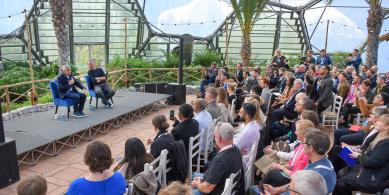The embedding of Airbnb into the fabric of greater cities has been talked about at great length in the press. In a major city like Paris with 80000 available hotel rooms, over 40000 accommodations are listed - those figures alone help us understand why the hospitality business is up in arms against the California-based startup and its perceived immunity.
In addition, rumors abound “bad trips” are reported and widely shared on social media. That man's house was robbed. An orgy took place in this one's home. Similar stories have dissuaded many owners, who were considering renting their property online, from actually doing it.
I booked an Airbnb in London, in an area that was being entirely renovated, a few blocks away from the Shoreditch district. « Stop Airbnb » stickers were plastered on all the mailboxes of this pristine building. My curiosity was piqued, so I asked the neighbor who lives there all year round about it. Her judgment was unequivocal: ''There's just too many available apartments. They are detrimental to the life of our community. We don't know these people, we barely have enough time to socialize and, often, they act rude.''
And yet here I am, booking with Airbnb once more, although in Puglia (Italy) this time around – in the small city of Nardò in the Salento region, a few miles from Gallipoli.
Despite its beautiful historic center, a jewel which reminds me of the wonders of Lecce, Nardò looks like a dying little town: not close enough to the sea, not big enough, surrounded by diseased olive trees (see Helen Mirren’s cause at the moment) and watermelon fields where African migrants sweat blood. The kind of village that sees the light three months a year during the holiday season, but otherwise mourns the loss of its youth gone to bigger cities of the north.
I had chosen a traditional Nardò home not far from Corso and the center of town. Convenient, beautiful, it was charming and the owner's kindness and availability were a testament to Brian Chesky and Joe Gebbia's concept.
The first night, I was on the rooftop overlooking the city, a glass of Polvanera and a slice of pizza al taglio in hand (zucchini flower, anchovy and mozzarella), when I noticed a group of eldery people chatting on the opposite roof. They would do so every single night.
I went to have a chat with my neighbor. What do I learn? That many abandoned homes in Nardò have found new owners. They are now renovated for the sole purpose of being rented on Airbnb. She says she likes it a lot because she often sees new faces. For a while, they become the talk of town. She feels like the city and its decrepit walls are rising anew, thanks to this newfound source of tourism.
Back in Rome, I am at a restaurant in my in law's district, far away from city center. The kind of restaurant where one would expect to meet nothing but locals. Yet the menu is also in English. I ask the owner about his business. He tells me the neighborhood has seen an influx of visitors thanks to the development of Airbnb, even in this remote corner of the city. The result? His clientele is now very similar to the one found in the heart of the capital.
The negative impact of Airbnb on the hospitality sector has been discussed at length. We should study its positive impact and how it may help revitalize the urban fabric of our cities.
As a firsthand account of personal experiences, my point of view is obviously subjective. Ten years down the line, it would be interesting to come back to Nardò, with the current generation gone and no more traditional homes left to renovate.
Then we will be able to answer the question: does Airbnb truly help revitalize town?
By Olivier Auroy, Joint Managing Director at Kantar Added Value
Newsletter
Enjoy this? Get more.
Our monthly newsletter, The Edit, curates the very best of our latest content including articles, podcasts, video.
Become a member
Not a member yet?
Now it's time for you and your team to get involved. Get access to world-class events, exclusive publications, professional development, partner discounts and the chance to grow your network.




